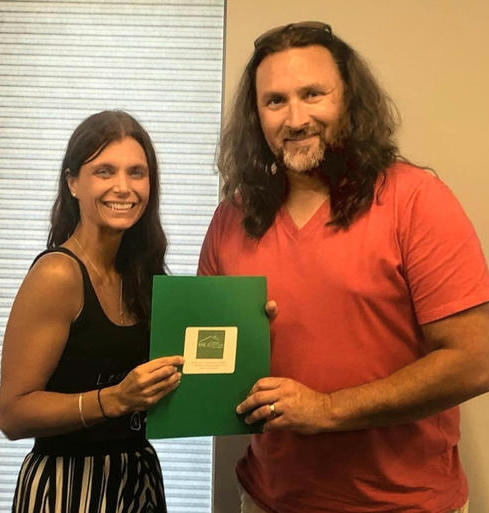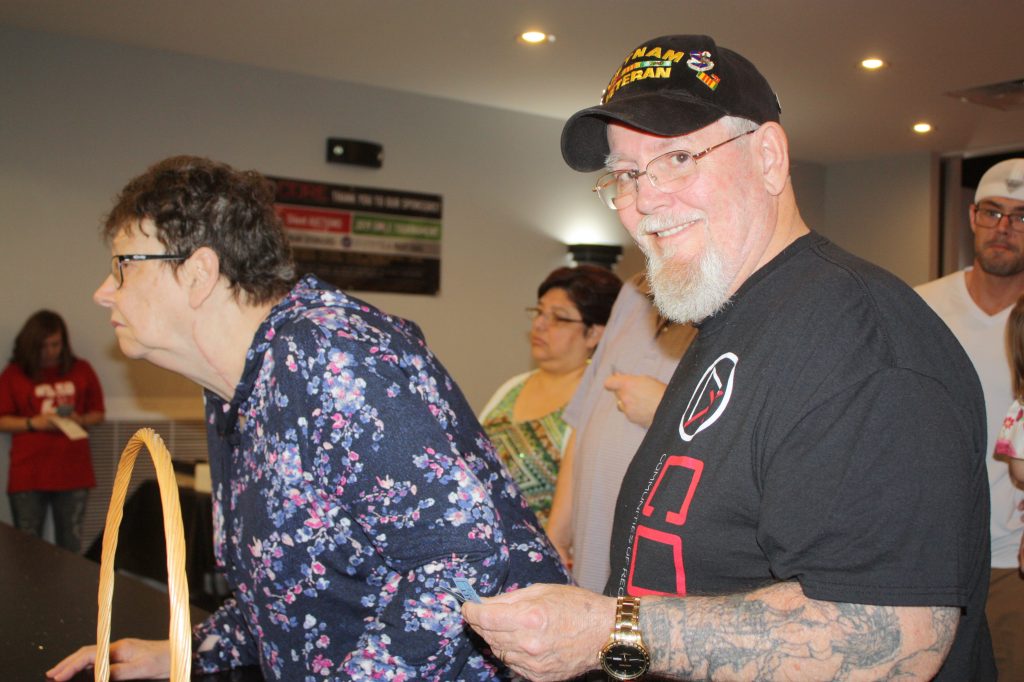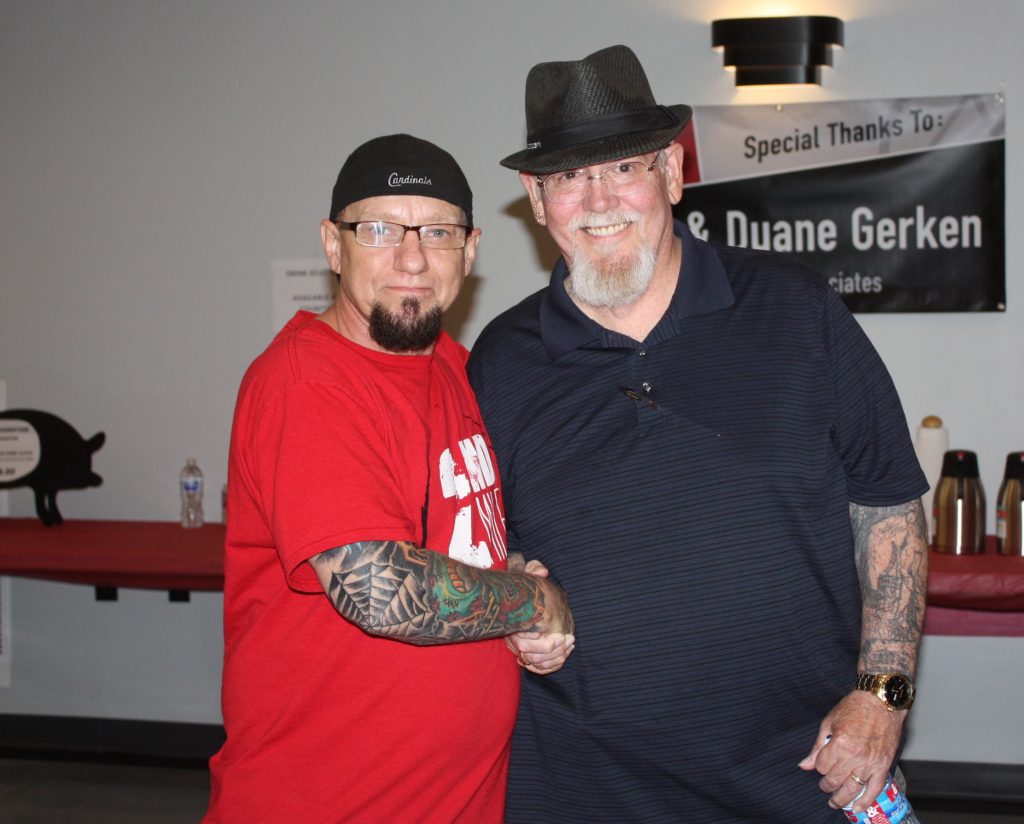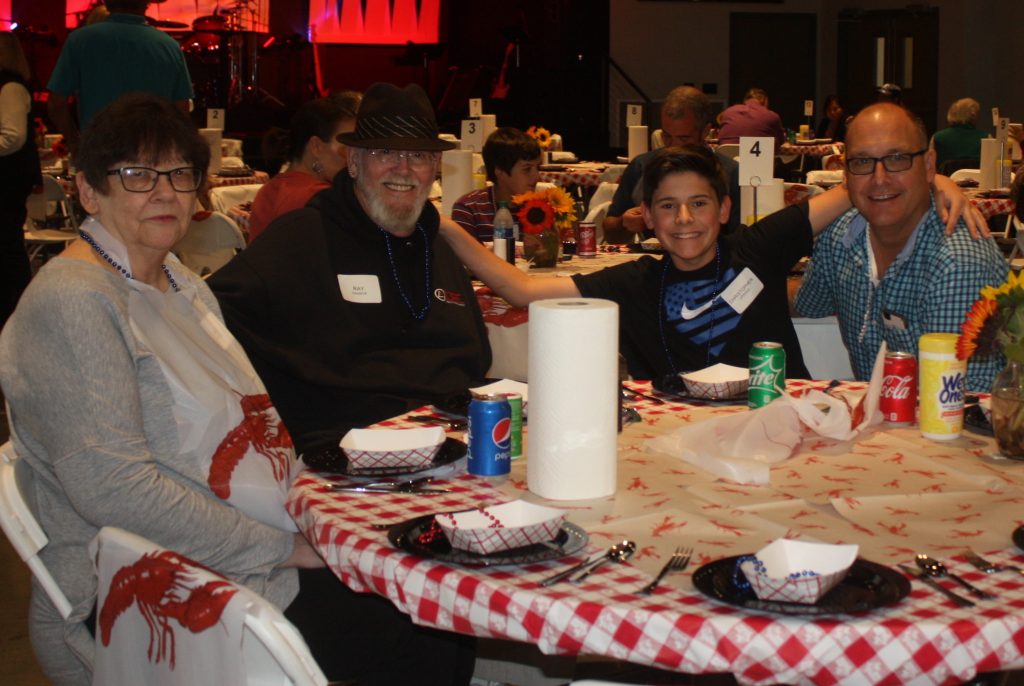Charlie Miller: Real Recovery Is No Fish Story!
Some think the oncorhynchus mykiss is the most fearful, finned creature known to man. When small animals went missing along the shoreline leaving only gooey puffs of fur behind, the tri-lakes communities went into an uproar! Chaos reigned at the townhall meeting until young CJ Miller raked his fingernails down a chalkboard to get the townsfolk’s attention. He and his old man Charlie would find that lake monster once and for all, they exclaimed, and save summer vacation season too! The night was black as coal when father and son set out on the foreboding waters. The boat nearly swamped when CJ hooked it, and Charlie held tight onto CJ’s boots to keep him from going overboard. Yet, in the end, in that age old battle between man and rainbow trout, this victory went to good guys Charlie and CJ! Now – nobody actually knows who captured the triumphant moment on film. Some say it was an overjoyed and grateful government official. Others say it was Charlie’s supportive and good humored wife. Whoever it was, the proof is right here:
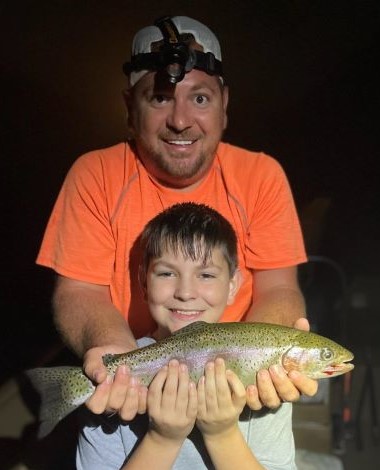
A whale of a tale? We honestly can say that Charlie did not make this story up. We did. But hey – we liked this picture of father and son reunited so much that we just had to add a matching back story. Moreover, while that story may be extravagant, Charlie will tell you, and we at CORE wholeheartedly confirm:
Real recovery is no fish story! With God all things are possible! In addition to recovering from a hopeless condition of mind and body, one can be reunited with family, find the true love of their life, and more! The essential foundation is reliance upon God and the working of a few simple steps.
To understand how Charlie arrived to CORE, we have to go back a number of years. He was only 12 when his father passed away, and his mother ended up working long hours to provide for him and his two brothers. In her absence the three boys went looking for fun. By the time he got into high school, Charlie was smoking marijuana and drinking. Then he discovered methamphetamines. When he graduated in 2009, “it was off to the races.”
During a five year run, Charlie “was boss of the log, had a good job, and was able to maintain it – life was still manageable.” He had a fiancé, his son CJ, a home, his own truck, and was living the high life. As so often happens with chronic meth use, the wheels eventually fell off. Charlie’s sole concern became getting and using meth – up to twenty or more times a day. That’s when things got bad:
“Bad gets when you rob and steal and do whatever you need to do in order to get that next fix. That’s bad. And when you can’t function normally without being high. It’s either, one, you’re in bed or, two, you’re high. That’s bad.”
Charlie ended up losing everything: his fiancé, son, job, home, vehicles – everything. He even was estranged from his own mother.
Now, it’s not that Charlie hadn’t tried to quit methamphetamines. For years he’d been in and out of treatment centers all around the Missouri Bootheel. “I really wanted to quit, but I didn’t know how,” he says. In 2015 Charlie again landed in a 21-day treatment center in Stapleton, Missouri. That’s when people from CORE showed up and did a presentation about the cycle of addiction and how to recover. When Charlie saw that, he said to himself, “You know what? I’m getting out of here.” He loaded up in the CORE van and rode back with them to Branson. “I came here with a trash bag of clothes and a carton of cigarettes – that’s it,” he says. Happily for him, he didn’t need material possessions to recover. His willingness to work the 12 Steps was more than sufficient.
One of the biggest differences between CORE and inpatient treatment programs, Charlie says, is that at CORE one learns to actually live in recovery. Treatment programs are institutionalized, highly regimented places. Everything one does is scheduled, from the time one wakes up in the morning to finally going to bed at night. By contrast, at CORE Charlie was able “to live my life and get recovery at the same time.” He had to go out into the world every day and face real-life challenges. He learned to live successfully by using the tools found in the Big Book.
Charlie also credits having a great sponsor, Gary Osborn, our Operations Manager. He describes Gary as “my sponsor and mentor, without a doubt the biggest influence on me getting where I am today.” Gary had years of recovery experience and had seen it all. Charlie remembers that, although Gary often “could tell me what would happen before it happened,” he didn’t always call Gary and admit that he was right (and then Charlie smiled and winked).
After completing our recovery program, Charlie continued with our Second Mile group. In due time he also became a house manager. Guys were coming to him for advice now, and he was expected to oversee them working the Steps. “I told myself, it wasn’t about me anymore. It was about the next guy coming in,” he says, “so I made sure that once a week we all ate together. We would go out and hang out together. Not only was I their house manager, I was also their friend.” He went on to run several houses. Charlie remembers the guys in his houses being like family, a brotherhood.
Charlie also began to address his financial responsibility for child support, which helped get him on the same page with CJ’s mother for visitation. Instead of being at odds, they worked together to make sure Charlie could see his son again. They’ve since rekindled the relationship, and Charlie spends every chance he gets with CJ. He attends his son’s sporting events and sees him on weekends and during vacations. CJ spends his summers with Charlie too. Among other things, they go fishing together!
Setting financial goals and sticking with them also allowed Charlie to bring his mom to Branson to live. He’s embarked on a new career too, and bought a home and car. The latter are important because, in August 2020, Charlie married his lovely wife Shea.
Shea and Charlie first met while he was still a CORE client, but it wasn’t until a couple years later that he saw her again and asked her out. They began dating exclusively but put off talk about making the relationship permanent because of Charlie’s responsibilities as a house manager. She supported his commitment to CORE every day they were together, Charlie remembers, throughout the entire journey. And married life? “It’s great,” Charlie says, “I’ve got the best wife in the world.” We at CORE have to agree with this last observation about her being the best wife, especially when husband and step-son come home parading a squishy fish around like they’ve just caught Moby Dick. A wife who can greet them with equanimity and good humor under these circumstances is alright in our book!
Charlie gives credit to CORE for helping him to recover, saying, “CORE saved my life, it’s the number one reason who I am today.” More than anybody, however, he credits God. When he first got to CORE and began working the Steps, Charlie realized that he had resentments against God. They’d been there since he was a child, when his dad died. His need for recovery forced him to put matters into a different perspective. “If you read the AA book and do what it says, it will lead you to God,” says Charlie, “you start to spot His blessings, the miracles.” He felt as if a weight were lifted from his shoulders while working the Steps, after which God has continually showed his goodness. Everyday Charlie strives to be better or learn something new. He also tries to go out of his way each day to help somebody without expecting anything in return. In gratitude to his Maker, Charlie wants to do this, “being able to be God’s blessing to somebody else!”

